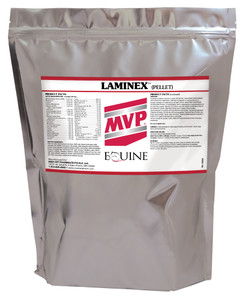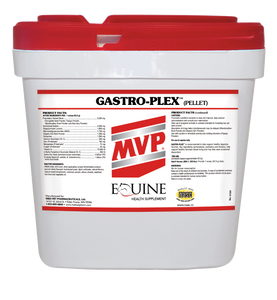Biotin is a member of the B vitamins family and, like some other vitamins, is a coenzyme for several metabolic pathways. It is involved in glucose metabolism, growth and utilization of niacin. Biotin helps aid in the growth of strong, healthy hooves due to its role in collagen formation. A number of research studies show that long-term, daily supplementation of 10-30 mg of biotin daily may help improve growth rate and hardness of hooves, especially in horses with less than optimum quality hoof horn (soft, brittle, chipped).
Methionine is an amino acid that must be provided in the diet since the body cannot create enough of its own. This means if it is not present in adequate amounts it limits the body's ability to make protein. Methionine can be converted by the body into another sulfur-containing amino acid, cysteine. Because the concentration of both these amino acids is highest in hoof and hair, methionine is often included in hoof health supplements.
Lysine is an amino acid and the only one for which a requirement in the horse has been established by the NRC and used for the biosynthesis of proteins. This amino acid is often the key to improving protein availability and healthy muscle function.
Sulfur is a macromineral and an important constituent of several amino acids (methionine, cystine, and cysteine) as well as the B vitamins biotin and thiamin, and a number of other important molecules such as insulin, taurine, and chondroitin sulfate Therefore, Sulfur serves major structure and function support roles in the body. It is a component of proteins such as enzymes and of connective tissue such as hooves, bones, cartilage, tendons and ligaments.
Pyridoxine (Vitamin B6) The Vitamin B family is made up of several compounds that serve many important roles in the body: protein, fat and carbohydrate metabolism; energy production; proper nerve cell transmission and reproduction.
Manganese is a micromineral that aids in bone formation, growth and reproduction. It also supports carbohydrate and fat metabolism. Supplementation should be considered because not all diets provide the same levels of manganese. It plays an important role in young growing horses as well as active performance horses.
Zinc (Zn) is a micromineral involved in over 100 enzyme systems ranging from support of connective tissue formation and antioxidants to carbohydrate metabolism and immune system function. It is most recognized for its role in healthy skin and hooves.
Copper (Cu) is a micromineral that aids in the production of normal connective tissues including tendons, ligaments, cartilage and bone. As a component of many enzyme systems, it is also involved in making iron available to the body for blood, in producing skin and coat pigments, in proper nerve signaling and in repairing antioxidants.
Selenium is a trace mineral that along with vitamin E function together to help to protect body tissues from free radical damage that occurs during oxidation (the conversion of feedstuffs into energy). While some parts of the country have high levels of selenium in their soil and therefore the plants that grow there, selenium deficiency is not uncommon and reported in many states. Therefore, most horses may require supplementation to meet the NRC requirement of 1-3 mg/day, depending on activity level. *NRC upper safe limit approx. 20 mg/day in total diet.
Probiotics are live microorganisms (bacteria and yeast) that help promote healthy digestive function and support a healthy immune system. Often referred to as ‘good bugs’ they help break down ingredients/contents that the body normally can't, and help inhibit ‘bad bugs’ from growing.
My 10-year-old quarter horse is fit and appears to be in good health. We usually compete most weekends, and she always does fine. However, she has terrible feet. They grow slowly, crack easily and she is constantly losing shoes, which stops us from competing. As far as I know, she consumes a well-balanced diet. I think she needs a hoof supplement, but there seem to be so many brands, all with different ingredients. Please, can you shed some light on what a good hoof supplements contains?
MVP: Hoof quality is dependent on a balanced ration, and the correct building blocks need to be present to support healthy hoof growth. The hoof wall is made up mostly of protein, proteins consist of amino acids, and there are a few specific amino acids that are important in forming strong healthy hooves. Methionine and lysine are two important amino acids that tend to be limiting, as they can be deficient in horse diets. Without these building blocks, hoof growth may be restricted and hoof integrity is likely to be poor. When you look for a hoof supplement, be aware that it should contain methionine in its formulation. The vitamin biotin is most widely known as a key ingredient in hoof health. Studies have shown that biotin levels of 15-20 mg per day have positive effects on the hoof wall. These effects take approximately 6-9 months to achieve so this is something to keep in mind when starting a product.
How long does it take to start seeing results with a hoof supplement?
MVP: Hoof supplements can only affect the new hoof growing out, so you would first see a change after the first few months up near the coronary band. Hooves grow at a rate of about 1/4 inch per month, so it can take up to a year for a new hoof to fully grow out.










